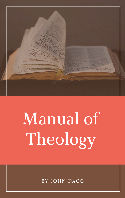Fundamental Doctrines of the Bible
By David Allen Reed
Fundamental Doctrines of the Bible is in 4 parts, God, Man, Sin and Redemption.
Contents of Fundamental Doctrines of the Bible
PART I–Concerning God.
PART II–Concerning Man.
PART III–Concerning Sin.
PART IV–Concerning Redemption.
Our promises:
1. Our goal is to bring you high quality Christian publications at reasonable and affordable prices. Therefore all of our works are complete and unabridged unless specifically stated otherwise, which means that unlike some other independent publications you get what you see and pay for. No unplesant surprises.
2. We endeavour to bring you updated editions of classic works. Therefore this work is not a scan, but is a completely digitized version of the original.
3. Unlike, many other independently published works, our publications are easy to read. Therefore you won’t find illegible, faded, poor quality photocopies here. Neither will you find poorly done OCR versions of those faded scans either, with illegible “words” that contain all kinds of strange characters like £, %, &, etc. Our publications have all been looked over and corrected by the human eye.
4. We can’t promise perfection, but we’re sure gonna try!
As an instructor of laymen in an interdenominational school for the past seven years, I have striven to teach the fundamental doctrines of the Bible received by all evangelical denominations.
Since this outline seemed to meet the need of my students, I have been asked to have it published that it might be used by the various Workers’ Training Classes, and Bible students generally, who desire a more thorough knowledge of these fundamental doctrines, but who cannot take the time necessary to read the larger works on theology.
No pretensions are made to originality in the subject matter, but a free use has been made of works studied during the preparation of the outline, and I acknowledge especially the helpfulness of “Christian Theology for the People,” by Willis Lord, D. D.; “Introduction to Christian Theology,” by Prof. Henry B. Smith, D. D.; “Handbook of Christian Theology,” by Rev. Benjamin Field; and “Outlines of Theology,” by Archibald Alexander Hodge, D. D., from which works the part on Redemption was largely taken.
I wish also to acknowledge the very valuable assistance of Rev. E. H. Knight in editing the book.
If some earnest student of the Word, some humble disciple of our Lord, is strengthened spiritually, is better fitted for his life work in saving and edifying souls, I shall be more than repaid for my labor.
DAVID ALLEN REED.
School for Christian Workers,
Springfield, Mass.
September, 1893.
Excerpt #1
PART I: Concerning God.
A. HIS BEING,
I. Attributes.
1. Self-existence. Life in Himself; underived; inexhaustible. Gen. 1:1, “In the beginning God.” Exo. 3:14,
“I AM.” Psa. 36:9. Isa. 41:4. John 5:26. Acts 17:24, 25. Rom. 11:35, 36.
2. Spirituality. God is a Spirit. Gen. 1:2. Deu. 4:15-19, (R.V.) Psa. 139:7. Isa. 60:1. Eze. 37:14; 39:29.
Joel 2:28, 29. John 4:24. Acts 17:28, with Heb. 12:9. Rom. 8:9, 15, 16. 1 Cor. 2:11. 2 Cor. 3:17.
3. Unity. The only God. Exo. 20:3. Deu. 4:35, 39; 6:4. 1 Sam. 2:2. 2 Sam. 7:22. 1 Kin. 8:60. 2 Kin.
19:15. Neh. 9:6. Psa. 86:10. Isa. 44:6-8; 45:22. Jer. 10:10. Joel 2:27. Zec. 14:9. Mar. 12:29. John 17:3. Rom.
1:21-23. 1 Cor. 8:4-6. Gal. 3:20. Eph. 4:6. 1 Tim. 2:5.
4. Eternity. Unlimited by time. Gen. 21:33. Exo. 15:18. Deu. 32:40. 1 Chr. 16:36, (R.V.) Neh. 9:5. Psa.
90:1-4. Isa. 44:6; 48:12; 57:15. Jer. 10:10. Lam. 5:19. Dan. 4:3, 34. Mic. 4:7. Hab. 1:12. Rom. 1:20; 16:26. 1
Tim. 1:17. Heb. 1:10-12. 2 Pet. 3:8. Rev. 4:8-10.
5. Immutability. Unchangeable in nature, or purpose. Exo. 3:15. Num. 23:19. 1 Sam. 15:29. Psa. 33:11.
Pro. 19:21. Ecc. 3:14. Isa. 14:24. Eze. 24:14. Mal. 3:6. Rom. 11:29. Heb. 6:17, 18. Jas. 1:17.
6. Omnipresence. Unlimited by space. Gen. 28:15, 16. Deu. 4:39. Jos. 2:11. 1 Kin. 8:27. Psa. 139:7-10.continued
Excerpt #2
COURSE OF THE ARGUMENT.
1. God is one. Unity is ascribed to God.
2. The Father is divine: a distinct person.
3. The Son is divine: a distinct person.
4. The Holy Spirit is divine: a distinct person.
5. The Father, Son, and Holy Spirit are classed together, separately from all other beings.
Excerpt #3
E. THE WORK OF REDEMPTION AS RELATED TO THE BELIEVER.
I. The Union between Christ and the Believer.
1. As to its nature.
a. Christ as the second Adam (1 Cor. 15:22) assumes in the covenant of grace those broken obligations of the covenant of works which the first Adam failed to discharge, and fulfils them all in behalf of all His “sheep”–those whom the Father has given Him.
b. Its spiritual and vital character.
(1) It is a spiritual union. 1 Cor. 6:17; 12:13. 1 John 3:24; 4:13.
(2) It is a vital union. John 14:19. Gal. 2:20.
(3) It embraces our entire persons. 1 Cor. 6:15, 19.
(4) It is an indissoluble union. John 10:28; 14:23; 17:21, 23. 1 The. 4:14, 17.
2. As to its consequences (in general)–
a. Believers have a community with Christ in his covenant standing and rights. Rom. 8:1. Eph. 1:6, 11, 13. Phi. 3:8, 9. Col. 2:10.
His mediatorial office embraces three principal functions:–(1) Prophet. In fellowship with Him the
believer is a prophet. John 16:13. 1 John 2:27. (2) Priest. The believer is also a priest in Him. Isa. 61:6. 1 Pet. 2:5. Rev. 20:6. (3) King. In Him the believer is also a king. 1 Pet. 2:9. Rev. 3:21; 5:10.
Download: Reed-fundamental-doctrines-of-the-bible






